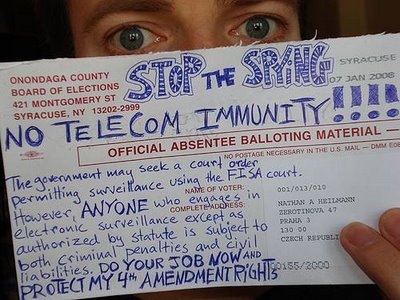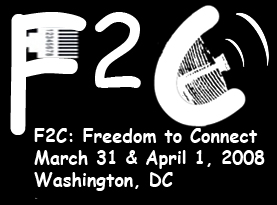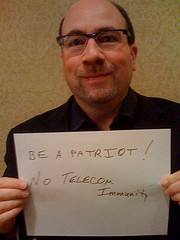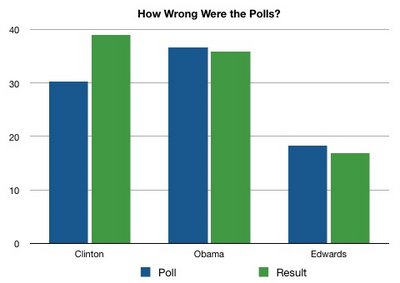Thursday, January 31, 2008
danah: Media are the Message
I've been dreaming of a woman president all my life. But then a friend of mine asked me if I'd vote for Condi just to have a women president and I was like omg no . . . the issues aren't the issue -- by and large, Barack and Hillary are on the same plan. Then they came to Los Angeles and one glaring difference became visible: Hillary is all about old media and Barack is all about new media. Hillary is totally in bed with big corporations (and Hollywood) and Barack embraced a lot of the innovative ideas put forward by independent startups and tech culture. This started to make me very nervous about Hillary. For me, net neutrality is a *HUGE* issue and I would hate to see the next president play nice with old media just to get some bribes.Her whole post . . . Oprah, Davos, etc., is worth reading. She concludes,
I made my decision and I'm going to vote with a level of enthusiasm unprecedented in my lifetime. I donated to his campaign and I'm going to vote for Barack Obama.Me too. And I feel the same way about Jim Himes for Congress.
Technorati Tags: NetworkNeutrality, Politics, danahboyd
Stroke, Medical Emergency
 The first signs of a stroke can be subtle, but if you suspect there might be a problem, DON'T WAIT!
The first signs of a stroke can be subtle, but if you suspect there might be a problem, DON'T WAIT!Seconds count. Minutes are critical.
Do the S.T.R.O.(ke) test by asking the suspected stroke patient:
S: Smile,
T: Talk
R: Raise both arms
O: Open mouth and Stick out Tongue
If there's asymmetry, it's an emergency. If the smile is crooked, if both arms don't go up together, if the tongue goes to one side, or if the potential patient can't say a simple sentence (e.g., "It's a sunny day today.") without slurring, rush patient to Emergency Room ASAP. Don't be polite when you get there; yell "Stroke," until you get help.
Alternatively, call an ambulance on 911. Your judgment.
The important thing is DON'T WAIT for the brain to swell, for the affected area to go hypoxic, etc. By then it's too late, brain damage has occurred; early treatment can prevent swelling and hypoxia.
If there's asymmetry, there's an emergency.
Early treatment can prevent brain damage or death.
Here's a story sent by a friend:
During a BBQ, a friend stumbled and took a little fall - she assured everyone that she was fine . . . she said she had just tripped over a brick because of her new shoes. They got her cleaned up and got her a new plate of food. While she appeared a bit shaken up, she went about enjoying herself the rest of the evening.Please pass the word to at least ten other people who don't read isen.blog . . .
Her husband called later telling everyone that his wife had been taken to the hospital. She died that evening. She had suffered a stroke at the BBQ. Had they known how to identify the signs of a stroke, perhaps she would be with us today.
Technorati Tags: 911, CognitivePsychology, PublicServiceAnnouncement, MedicalEmergency
Quote of Note: Tom Tauke
Tom Tauke, Verizon EVP Public Affairs, Policy and Communications, at the State of the Net conference yesterday, quoted here.
Technorati Tags: Conferences, Content-Conduit, NetworkNeutrality, Verizon
Tuesday, January 29, 2008
Victory! (battle not war)
Technorati Tags: AT&T, FourthAmendment, Telco, Wiretap
Monday, January 28, 2008
Craigslist Craig on Telecom Immunity
Pic>1kword: No Telco Spying

There are many more powerful photos where this came from.
It's an EFF campaign called "Stop the Spying."
Another Telecom Immunity Monday
In its current form, the FISA bill includes retroactive immunity for telephone company illegal wiretapping, so it should not pass. Senator Dodd and Senator Feingold have promised a filibuster, which keeps the bill from coming to a vote.
Rumor has it that both Clinton and Obama, two of the three Senators who are running for president (3=McCain) have interrupted their campaign to come to the Senate floor today and vote against cloture.
This is a huge victory! If you called, if you wrote about this, if you cared, you should be proud!
Technically, Obama and Hillary don't have to be there. Cloture can pass at 60-0 or fail 59-0 -- the critical factor is 60 aye votes.
But I am heartened that both Clinton and Obama see telecom immunity as a critical issue. And I am optimistic that they will convince several of the pro-cloture Democrats (reportedly Rockefeller, Bayh, Mikulski, Pryor, Salazar, McCaskill, Nelson (FL), Carper, Nelson (NE), Landrieu, Inouye, and Johnson) to withhold that aye -- and, perhaps, sway enough Senators to vote out a FISA bill without amnesty for telco spying.
Technorati Tags: AT&T, FourthAmendment, Politics, Telco, Wiretap
Friday, January 25, 2008
Hillary Clinton's User Interface is broken
Obama's fighting against illegal telco spying. So's Edwards. Maybe Clinton too, and I want to call to urge her to stop campaigning for a few hours, go to the Senate and exert leadership to persuade a few more Senators to vote against cloture so AT&T's warrantless spying isn't retroactively decriminalized.
[Can you believe the spineless Democratic Senators who want to let the telcos off the hook?Apparently these include Rockefeller, Bayh, Mikulski, Pryor, Salazar, McCaskill, Nelson (FL), Carper, Nelson (NE), Landrieu, Inouye, and Johnson. (Oh, by the way, if the thing never goes to trial Bushco misdeeds stay covered up too!)]
So I call Clinton's Senate office, (202) 228-0282, and it is busy, busy, busy, busy, busy, busy, busy, busy, busy, busy, busy, busy at least twelve times in a row.
Then I call Clinton's campaign office, (703) 469-2008, and after a long voice menu there's a chance to leave a message in "The General Mailbox" -- you'd think they'd call it "The Citizen Comment Mailbox" or maybe *have* a special mailbox for citizen comments -- and the announcement says, "Your comments are very important to us, please leave a message . . . We're sorry this mailbox is full, press zero for more assistance," and when I press zero I'm right back to the General Mailbox message, an infinite loop.
Technorati Tags: Constitution, FourthAmendment, Politics, Stupidity, Telco, Usability, Wiretap
Thursday, January 24, 2008
Comcast continues P2P blocking
The SF Weekly story says:
The experiment Eckersley and I ran replicates private and public versions that emerged last fall through an Associated Press story. That story confirmed what many in software circles knew for most of 2007: Comcast has been looking at its users' Web traffic and secretly blocking some of the Internet, namely BitTorrent uploads, to users outside Comcast's network.
This is tantamount to putting nails in the road for traffic management.
Thanks to boingboing for the pointer!
Technorati Tags: Comcast, Content-Conduit, NetworkNeutrality
You won't see THIS on TV!
He asked a friend to film it. Good thing too, cause you'll NEVER see this on any mainstream medium! Not even a non-AT&T sponsored show. The interview was scrubbed half way through.
I think this is almost as good as when John Stewart told Tucker Carlson to get a life on national TV.
BoingBoing Gadgets article.
Link to Youtube video.
Hat tip to Bob Frankston for this pointer!
Technorati Tags: AT&T, Censorship, Copyright, MainStreamMedia, BoingBoing, video, Wiretap
Wednesday, January 23, 2008
Quote of Note: Senator Chris Dodd (D-CT)
Chris Dodd, promising to filibuster against retroactive immunity for spying telephone companies beginning tonight. [source]
UPDATE here.
Technorati Tags: Constitution, FourthAmendment, QuoteOfNote, Wiretap
URGENT Davos vs The Constitution
UPDATE:
Harry Reid (202) 224-3542
Hillary Clinton (202) 224-4451
Barack Obama (202) 224-2854
The FISA Bill is on the Senate floor now, complete with retroactive immunity from The U.S. Constitution for spying telcos. And new invasive warrantless eavesdropping powers. Harry Reid wants to pass it ASAP so the Senators can go to Davos.
Really!
What'll it be Senators? The Constitution? Or a chance to rub shoulders with billionaires and kings at some fancy-pants conference?
Glen Greenwald reports in Salon that Harry Reid said,
We have to finish FISA this week. Everyone should be aware of that point. We have to finish it this week. I know there are important trips people want to take. We have the very important economic conference in Davos that Democrats and Republicans alike would like to go to.and Senator Leahy said
Mr. President, we have a number of Members who are supposed to go to the Davos economic summit tomorrow night, and I would note I have talked with Senator Bennett of Utah, who is the senior Republican on that trip, and the trip that is set to leave tomorrow night will not. We will put it on hold until Thursday, to determine whether we can leave on Thursday.It certainly sounds like they'd rather sell out the Constitution so they can go play in Davos. I'm outraged.
Will Chris Dodd and Russ Feingold filibuster? I hope so.
Technorati Tags: ChrisDodd, Conferences, Constitution, FISA, FourthAmendment, Wiretap
F2C: what others are saying!
 I'm so proud when past F2C participants wax a shine on the upcoming F2C: Freedom to Connect conference I'm pulling together (March 31 and April 1, in Washington DC)!
I'm so proud when past F2C participants wax a shine on the upcoming F2C: Freedom to Connect conference I'm pulling together (March 31 and April 1, in Washington DC)!Cluetrain coauthor Doc Searls blogs that F2C is, "one of my favorite events. I’ll be going. If you care about the future of the Net, and how it is regulated (and de-regulated) in the U.S., I highly recommend it."
Reverend AKMA, an Episcopal priest, as well as a theologian, author, technologist and blogger, says that F2C is, "a pivotal meeting at a pivotal moment in the trajectory of U.S. participation in cultivating the digital dimension of our common life, and I hope some legislative types (maybe even some candidates) pay attention to what develops there."
Alex Goldman, Managing Editor of ISP Planet, devotes an entire ISP Politics column to "Why I'm Attending the Freedom to Connect Conference." He writes, in part,
In some ways, it's a minimalist conference . . . In other ways, it's 21st century chaos. The conference uses the movie theater screen to project a live IM discussion that occurs behind the speaker while the event is happening . . . Important points are debated and even footnoted, with key sources listed, all in real time.Tech deep-thinker Frank Paynter writes, "David’s spring conclaves actually create some shared understanding of our networked information infrastructure and some political momentum toward addressing threats and challenges we face . . . see you there . . . "
Bill St. Arnaud, the research guru of the all-optical Internet and a speaker at this year's F2C, writes, "I encourage all those who are interested in the issues of global warming and how the Internet call help mitigate against the greatest challenge of our lifetime to attend the upcoming Freedom to Connect Conference in Washington DC."
If you know of other recent substantive comments about this year's F2C, even negative ones, please send them my way!
Technorati Tags: Conferences, F2C, F2C2008
Quote of Note: Robert B. Reich
How much worse can it get? The housing bubble drove home prices up 20 to 40 percent above historic averages relative to earnings and rents. So now that the bubble is bursting, you can expect prices to drop by roughly the same amount, and new home construction to contract. The latter plunged last month to its lowest point in more than 16 years. A managing partner of a large Wall Street financial house told me a few days ago the scenario could get much worse. He gave a 20 percent chance of a depression.Robert B. Reich, Bill Clinton's Secretary of Labor, in today's Salon. Thanks to DewayneNet Technology List, run by Dewayne Hendricks, for the pointer.
Even if a stimulus package were precisely targeted to consumers most likely to spend any money they received, the housing slump could overwhelm it. According to a recent estimate by Merrill-Lynch, the slump will hit consumer spending to the tune of $360 billion this year and next. That's more than double the size of the stimulus package President Bush or any leading Democrat is now talking about. And the Merrill-Lynch estimate is conservative.
In reality, the crisis is both a credit crunch and the bursting of the housing bubble. Wall Street is in terrible shape and Main Street is about to be in terrible shape. And there's not a whole lot that can be done about either of these problems -- because they are the results of years of lax credit standards, get-rich-quick schemes, wild speculation on Wall Street and in the housing market, and gross irresponsibility by the Fed, the Treasury and the Comptroller of the Currency.
As a practical matter, our only real hope for avoiding a deep recession or worse depends on loans and investments from abroad -- some major U.S. financial firms have already gotten key cash infusions from foreign governments buying stakes in them -- combined with export earnings as the dollar continues to weaken. But this is something no politician wants to admit, especially in an election year. So we're going to go through weeks of posturing about stimulus packages of one sort or another, and then see enacted the big fat bonanza of a temporary tax break that will likely have little effect. That, perhaps along with a few more rate cuts by the Fed. The presidential candidates will be asked what should be done about the worsening economy, and they'll give vague answers. None will likely admit the truth: We're going to need the rest of the world to bail us out.
Technorati Tags: Bushco, Economics, Global, QuoteOfNote, ScenarioPlanning
Tuesday, January 22, 2008
More great stuff at F2C: Freedom to Connect
 Three announcements today:
Three announcements today:1) We've added two speakers to our already-illustrious program:
Clay Shirky, author of the soon-to-appear book, Here Comes Everybody: The Power of Organizing Without Organizations, who was recently described as "maybe the finest thinker we have on the Internet revolution," and . . .
Suw Charman, co-founder of the Open Rights Group in the UK, advocates for civil liberties in the digital world, social software expert and blogger. [Suw's presence at F2C is supported by The Mozilla Foundation.]
2) Howard Levy will return to the F2C stage as Musician in Residence, joined this year by jazz guitar monster Chris Siebold. These guys are beyond amazing. [Musicians at a tech policy conference? Fair question. No easy answer, but it works. Come see . . . ]
3) Discount for NATOA Seminar Registrants: NATOA, the National Association of Telecommunications Officers and Advisors, is holding its 2008 Policy and Legal Seminar April 2-4 in the Washigton DC area, right after F2C. The program will be of great interest to many F2C participants. If you are registered for F2C, you can register for the NATOA seminar for $125 off the regular price! And if you're registered for the NATOA Seminar, you can get the same discount for F2C! Write to isen@isen.com for specifics.
Technorati Tags: Conferences, F2C, F2C2008, HowardLevy, Music
Monday, January 21, 2008
Pic>1kword: MLK & LBJ
Friday, January 18, 2008
I didn't see this on CNN
What Bush won't see (a backgrounder for Bush's mid-east trip last week).
Bush in the Lion's Den (a history of Bush's dealings with Israeli & Palestinian leaders that goes back to when he was Governor Bush).
I'm not sure that either video made it onto the US version of CNN.
The videos, by CNN reporter Ben Wedeman, were pointed out to me by my friend Sara Wedeman, Ben's proud sister.
Technorati Tags: Press, MainStreamMedia, video
Thursday, January 17, 2008
Time Warner Cable does the right thing
Savetheinternet.com points out -- correctly -- that TWC's scheme, "is little more than a band-aid for our bigger broadband problems." And there's the rub. While France and Japan and twenty other nations are rolling out copious quantities of Internet connectivity, the U.S. is mired in managing scarcity.
TWC, at least, is managing it openly and non-deceptively. That's fainter praise than my original reaction. The faintness is warranted.
My original post from this morning here:
The news that Time Warner Cable is trialing a plan to charge more when you send or receive more Internet data is not bad news. It is not as great as it could be, but in my opinion it is a huge step in the right direction. It's not worthy of a standing ovation, but it's not the last act. Polite applause are in order.
If you must manage congestion, then doing it explicitly is, at very least, honest. It is better than doing it (a) covertly or (b) indirectly, by injecting artificial interrupts and (c) denying you're doing it -- like Comcast currently does.
If the problem is, indeed, congestion, or the related problem that a few "bandwidth hogs" are using more than their share of the network's capacity, tiered pricing is a simple, straightforward solution.
Of course, it does discriminate against high-bit-rate applications, such as video. But it does so in an above the board manner. The pricing details, when they emerge, will be key to whether this discrimination is seen as fair or as anti-competitive.
The report says that customers will be able to monitor their usage and upgrade easily on line. This can help customers gain a sense of understanding and control. Again, details as to how this will actually work will be key.
Let's remember that getting an offer like this right is an iterative process. We should help TWC, not kill them. As long as they don't discriminate on the basis of specific applications or devices or app providers, and provided they don't charge grossly unfair amounts for video levels of traffic usage, and provided they continue to upgrade their network as technology improves, what they're doing is a good thing.
Disclosure: I did a paid presentation to TWC a couple of years ago. And Time Warner, the parent company, has sponsored isen.com events. Over the last few years, I've argued with TWC management vigorously, advocating Network Neutrality, openness, and explicit network management. I have no idea whether any such discussions led to the current news, but I'd like to think so. I also think it speaks well of TWC management that they'd engage with me . . . NONE of the ILECs have done so. And, as usual, the opinion above is my own; nobody told me, asked me or paid me to say (or not say) anything.
Technorati Tags: Cableco, Comcast, NetworkNeutrality, OpenAccess, TimeWarner
Wednesday, January 16, 2008
The Network Management Excuse
Referring to the recent submissions to the FCC by Free Press and Public Knowledge and Vuze complaining about Comcast's use of reset packets to block applications that compete with Comcast's own proprietary video entertainment offering, Cleland says "Network management trumps net neutrality."
There are lots of reasons for, ahem, managing. Cleland neglects to observe that controlling congestion the way Comcast does it is like scattering nails in the road for traffic control.
Cleland continues, it is " . . . preposterous [that the Four Internet Freedoms should have a] legal and binding effect." He says that, "law trumps FCC rules, FCC rules trump FCC policy statements." The Four Internet Freedoms, in the Martin FCC, are a policy statement.
Policy statements are, indeed, at the bottom of the enforcement totem pole. The washy, wishy policy statement, washy as originally articulated by Michael Powell, and even wishier under Martin [compare Powell and Martin versions here], with footnotes loose enough to drive a truck through sideways, should be strengthened to make the creation and dissemination of data as much of an entitlement as its reception and use. Then the policy statement should be given the force of law. And it should be enforced with a wise purview and an iron hand. A difficult job at every step.
In paragraph three, Cleland turns on the after-burners, saying it is, "naive, irresponsible, and unreasonable . . . that networks with an end-to-end design magically manage themselves or require no management, investment, or maintenance whatsoever."
Nobody, nobody, nobody is saying that. We've gotta have network management. Cleland's rhetoric here is shamefully mis-directive. Remember the red herring that NN meant that you had to treat every packet identically or you would be breaking the law? Nobody said that either. This is one of those.
For network management to be legit, it has to be for congestion control, not to control the competition.
Cleland neglects to mention that a stupid network, or an end-to-end network, or a network of conduit, not content, is a very simple network with very simple network management needs. It's only when Kontent Konflates with Kongestion that Komplexity arises.
Cleland's hinge is that the proponents of Network Neutrality are petitioning the FCC to manage carrier networks rather than the carriers themselves. This was predictable. In fact I predicted it, especially here. I must say I agree. The situation exists because the carriers have a financial interest in what they are carrying.
As long this financial interest exists, the carriers have an overwhelming motive to "manage" in ways that advance their interests and disadvantage competing interests. If the telcos divested all interest in what they're carrying, there would be no problem with them managing their networks. They could manage their networks as innovatively and creatively as they wanted without further regulation, and the motive for anti-competitive behavior would not exist.
Cleland's willful ignorance extends to the end-to-end principle as it is embodied in Internet architecture. It surfaces in his claim that Net Neutrality would overturn the Americans with Disabilities Act. He ignores the fact that the Internet shifts the whole idea of "accessibility" to the application layer. He ignores the fact that once a carrier provides the pipe, it doesn't need to worry about the accessibility of the applications. The programmer, not the carrier, turns text to speech for the blind, amplifies the lower frequencies for the hearing impaired, and provides the voice command interface for those unable to use a keyboard. Only in telcoland are apps and pipes inextricable.
In this post, Cleland appeals to "common sense" eleven times. Network engineer John Quarterman observes that this appeal, "means he knows he doesn't actually have a legal argument." Quarterman concludes,
It's not about network management. It's about corporate and political control of the Internet trying to stifle net neutrality and Internet freedom.Yes. But don't expect today's FCC to act accordingly.
Technorati Tags: Comcast, Content-Conduit, End-to-End, FCC, Infrastructure, NetworkNeutrality, savetheinternet, StructuralSeparation
Tuesday, January 15, 2008
What didn't happen
But now the whole thing is, like, failing to get any traction. I wonder, if we depended only on a newspaper or two and the nightly news, the way we did in August, 1964, would the U.S. now be launching bombers on Iran? Did the free flow of information and citizen news analysis (e.g. this, this, and about 2,167 others) that the Internet enables help avert a Tonkin-style attack? What is the sound of one hand applauding wildly?
Technorati Tags: Bushco, CrowdSourcing, Press, War
Friday, January 11, 2008
Close the Gitmo Gulag
Let's close it down.
Update: If you harbor any lingering inklings that the victims of Gitmo might need to be there, reading Andy Worthington's book, The Guantánamo Files: The Stories of the 774 Detainees in America’s Illegal Prison is likely to dispel them.
Technorati Tags: FifthAmendment, FourthAmendment, Freedom, Stupidity, Torture
Thursday, January 10, 2008
FBI wiretaps disconnected 'cause it didn't pay the phone bill
. . . the telecoms, who are claiming they were just being "good patriots" when they allowed the government to spy on us without warrants, are more than willing to pull the plug on national security investigations when the government falls behind on its bills. To put it bluntly it sounds as though the telecoms believe it when FBI says warrant is in the mail but not when they say the check is in the mail.
Technorati Tags: Bushco, Wiretap
Konflating Kopyright and Kongestion
New details of AT&T's private policing plan emerged this week at CES. [Here's one report.]
AT&T frames the "problem" in a way that conflates two separate issues. The first is network congestion. The second is copyright violation. An NBC representative makes this conflation obvious when he says, "The volume of peer-to-peer traffic online, dominated by copyrighted materials, is overwhelming . . ." [That quote's here.]
The two issues should be separated.
Network congestion has some very simple solutions. First, replace those few network nodes or facilities that are undersized. (See work by Odlyzko & Coffman, 1998, and Odlyzko, 2003 [.pdf] for supporting data.) Second, where up-sizing is not possible, or not cost effective ( which is almost always at the edge of the network) it is simple for an Internet access provider to explicitly count packets and either (a) throttle data rates, or (b) offer explicit tiers of service so that more throughput costs more. The carrier can do this without knowing what the data represent; in fact, it is easier and cheaper to simply count packets than it is to look inside them to infer what the ones and zeros represent.
The other problem, copyright violation, is more subtle. It is perfectly legal to send copyright materials over the Internet under the doctrine of fair use, and it is impossible to examine the materials to determine whether fair use applies. AT&T spokesman James Cicconi implies that AT&T will make that determination after alleged violations have been automatically flagged. Such a kill-them-all-and-let-God-sort-it-out approach would shift the costs of enforcement onto society at large, including the creative community that copyright was designed to protect in the first place. Even if it is done in a "friendly way," as AT&T's Cicconi proposes.
However, there are simple solutions to the copyright problem. If a flagrant copyright violator is, indeed, making money from materials he or she does not own, that violator would need to advertise or otherwise make a public offer to sell the offending stuff. The public offer is publicly detectable, and this is where copyright owners and their agents should act. There are other solutions too, e.g., takedown as mandated by the DMCA. (Whether or not you buy into the specifics of DMCA takedown, at least it addresses content at the application layer, without involving the network's infrastructure.) In any case, the question, "Do the benefits to music and movie moguls of let-God-sort-it-out enforcement out-weigh its costs to society?" is one that we can address independently of network congestion.
David Weinberger says "the carriers are the last people I trust to make decisions about what’s important and acceptable." But even he, author of truly great books, conflates congestion with copyright, and this draws a comment from Seth Finkelstein, who takes network congestion as a given (which it isn't!) and asks, "who do you nominate to make [the] decision" about what traffic to block or delay?
I nominate the end-user to make the decision. If, as I propose above, Internet access providers were to provide explicitly different tiers of service for different, explicitly laid out throughput plans charged at different rates, the user could make that decision. And it would be a free market decision that even a libertarian would love. The carrier would need to decide whether to (a) eat the cost of upgrading its infrastructure to allay the risk of losing customers to bad performance or (b) implement tiered service to save network upgrade costs but risk losing customers who don't like paying for tiered service. But, hey, that's business.
Carriers know all this. But, as it turns out, they don't want to frame the picture simply because they don't want to be in the Stupid Network business. They're addicted to adding value. They've convinced one class of customers, music and movie moguls, that they can add value for them. Importantly to the carriers, the value they propose to add is network-resident value; the return of the Intelligent Network. Network-resident value is business as usual, even when it imposes huge costs on the rest of society. This is why they persist in framing the two issues as inter-related.
When they persist, I propose we point this out by spelling the conflated issues "kopyright" and "kongestion."
We who appreciate the end-user value of the Internet should do our best to keep the two issues, congestion and copyright, separate.
UPDATE: Harold Feld weighs in.
Technorati Tags: AndrewOdlyzko, AT&T, Competition, Content-Conduit, Copyright, Customer, DavidWeinberger, DeepPacketInspection, FairUse, Framing, IncreasingReturns, NetworkNeutrality, ParadoxoftheBestNetwork, savetheinternet
Wednesday, January 09, 2008
Pic>1kword: How Hillary won in New Hampshire
Tuesday, January 08, 2008
Olds Magazine
Nevertheless, as David Weinberger was shocked, shocked, shocked to discover, Parade ran a cover story on Benazir Bhutto on January 6, 2008 that didn't even mention she has been assassinated on December 27, 2007. Parade's Web site apologizes.
Doc Searls coinage, "olds" (versus news), applies.
Technorati Tags: DavidWeinberger, DocSearls, Press, Latency
Thursday, January 03, 2008
More great speakers at F2C: Freedom to Connect
 F2C: Freedom to Connect, the conference that brings the Netheads to Washington, DC, to be held March 31 and April 1 in Washington, DC, announces a second tranche of great speakers, including:
F2C: Freedom to Connect, the conference that brings the Netheads to Washington, DC, to be held March 31 and April 1 in Washington, DC, announces a second tranche of great speakers, including:- Bruce Schneier [bio], internationally-renowned security technologist and blogger.
- Dirk van der Woude, Program Manager of Amsterdam's world-leading FTTH offer.
- John St. Julien, grassroots champion of Lafayette, Louisiana's FTTH network.
- Susan Crawford, founder of OneWebDay, ICANN Board Member, blogger.
- Kevin Moss, BT America's head of Corporate Responsibility [interview].
- Danny O'Brien [bio], EFF's International Outreach Coordinator.
- Bas Boorsma [bio], head, Cisco's Connected Urban Development Program.
- Jim Baller [bio], advocate for a US National Broadband Strategy [lots of links].
Special "very early bird" admission prices are in effect through January 6. Register at http://freedom-to-connect/#registration.
Technorati Tags: Conferences, F2C, F2C2008, Nethead
Wednesday, January 02, 2008
Oil hits $100 a barrel
Mark Anderson predicted $100 oil in 2008, what a guy, it had already hit $98 and change in 2007. (It's my candidate for the lamest prediction of 2007.) Myself, I think we're gonna see $200 before 2010.
Matt Oristano, who's planning to build a super-insulated house, writes, "Most of my neighbors live in tear-downs, they just don't realize it yet."
UPDATE (1/7/08): Bloomberg: Oil $200 Options Rise 10-Fold in Bet on Higher Crude
The fastest-growing bet in the oil market these days is that the price of crude will double to $200 a barrel by the end of the year. Options to buy oil for $200 on the New York Mercantile Exchange rose 10-fold in the past two months to 5,533 contracts, a record increase for any similar period . . .Thanks to Anders Fernstedt for this update . . .
Technorati Tags: HubbertsPeak, Oil
Tuesday, January 01, 2008
My top five new year's lists
Skype Journal's 8 non-Skype technologies [link].
Top ten data (i.e. privacy) breeches of 2007 [link] -- thanks to Ken Camp.
The American Film Institute's Moments of Significance for 2007 [link].
The Golden Duke Awards [link] for the outstanding scandal mongers of 2007.
Update:
#6. Esme Vos' Top Ten Apps of 2007 [link].
Technorati Tags: 2007







